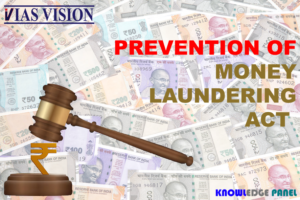Money Laundering Act 2002
Money Laundering Act, 2002 and FATF
Money Laundering Act, 2002
FATF & Money Laundering Act:
Indian government passed the Money Laundering Act, 2002 to become part of the safe and secure financial global order:
Money Laundering – Meaning
Money and crime are related to each other. Crimes are done because lot of money involved in it. Money created by crimes when converted into white money it is known as Money Laundering. In simple words, Money Laundering refers to converting illegal earned money into legitimate money.
Those who commit the underlying criminal activity may attempt to launder the money themselves, but increasingly a new class of criminals provides laundering services to Organized Crime.
Objectives and scope of the Money Laundering Act, 2002
The Money Laundering Act, 2002 seeks to combat money laundering in India. Various
objectives of the Act are as follows:
- To prevent and control money laundering.
- To confiscate and seize the property derived from, or involved in, money-laundering.
- To provide punishment for offence of money-laundering.
- To appoint the Adjudicating Authority and Appellate Tribunal to deal the matter connected with money laundering.
- To put obligations on banking companies, financial institutions and intermediaries to maintain records.
- To deal with any other issue connected with money laundering in India.
Scope: The Money Laundering Act, 2002 extends to the whole of India.

Process of Money Laundering
Money laundering is commonly defined as happening in three steps:
- The first step involves introducing cash into the financial system by some means (placement);
- The second involves carrying out complex financial transactions to camouflage the illegal source (layering); and
- The final step entails acquiring wealth generated from the transactions of the illicit funds (integration).
Placement Stage: Placement stage represents the initial entry of the “dirty” cash or proceeds of crime into the financial system. Generally, this stage serves two purposes:
-
-
- It relieves the criminal of holding and guarding large amounts of bulky of cash; and
- It places the money into the legitimate financial system.
-
Impact of money laundering on development
Impact of money laundering on development is given below:
(1) Increased Crime & Corruption: Successful money laundering helps to make criminal activities profitable. If money laundering is prevalent in a country, it generates more crime and corruption. It also enhances the use of bribery.
(2) Damaged reputation and international consequences: A reputation as a money laundering or terrorist financing haven could cause significant adverse consequences for development in a country. Foreign Financial Institutions (FII) may decide to limit their transactions with institutions from money laundering havens. Even legitimate businesses and enterprises from money laundering havens may suffer from reduced access to world markets or access at a higher cost due to extra scrutiny of their ownership, organization and control systems.
(3) Weakened Financial Institutions: Money laundering and terrorist financing can harm the soundness of a country’s financial sector, as well as the stability of individual financial institutions in multiple ways.
(4) Compromised economy and private sector: Money launderers are known to use “front companies” i.e., business enterprises that appear legitimate and engage in legitimate business but are, in fact, controlled by criminals.
These front companies co-mingle the illicit funds with legitimate funds in order to hide the ill-gotten proceeds.
(5) Damaged privatization efforts: Money launderers threaten the efforts of many countries to reform their economies through privatization. These criminal organizations are capable of outbidding legitimate purchasers of former state-owned enterprises. When illicit proceeds are invested in this manner, criminals increase their potential for more criminal activities and corruption, as well as deprive the country of what should be a legitimate, market-based, taxpaying enterprise.
FATF & other International initiatives to control money laundering
FATF & Money Laundering Act:
Initiatives taken at international level to deal with the problem of money laundering
Since money laundering is an international phenomenon, transnational co-operation is of critical importance in the fight against this menace. A number of initiatives have been taken to deal with the problem at international level which are given below:
- The UN or the Bank for International Settlements, took some initiatives in 1980’s to address the problem of money laundering.
- With the creation of the Financial Action Task Force (FATF) in 1989, regional groupings, such as the European Union, Council of Europe, and organization of American States also established anti-money laundering standards for their member countries.
- The major international agreements addressing money laundering include the UN Convention against Illicit Trafficking in Drugs and Psychotropic Substances (the Vienna Convention) and Council of Europe Convention on Laundering, Search, Seizure and Confiscation of the Proceeds of Crime.
- The role of financial institutions in preventing and detecting money laundering has also been the subject of pronouncements by the Basle Committee on Banking Regulation Supervisory Practices, the European Union and the International Organization of Securities Commissions.
UN global Programme against money laundering
Office of the Drug Control and Crime Prevention implement this programme against Money Laundering with a view to increase the effectiveness of international action against money laundering through comprehensive technical cooperation services offered to Governments.
Objectives and functions of the Financial Action Task Force (FATF)
The Financial Action Task Force is an intergovernmental organization founded in 1989 on the initiative of the G7 countries to develop policies to combat money laundering.
In 2001 the purpose expanded to act on terrorism financing. It monitors countries’ progress in implementing the FATF Recommendations by ‘peer reviews’ of member countries. The FATF Secretariat is housed at the headquarters of the OECD in Paris.
Main tasks of the FATF are:
- Monitoring members’ progress in applying measures to counter money laundering.
- Reviewing money laundering techniques and countermeasures.
- Promoting the adoption and implementation of appropriate measures by non-member countries.
